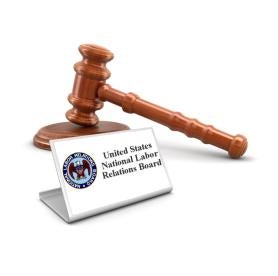On November 4, 2022, the NLRB published a Notice of Proposed Rulemaking (“NPRM”) inviting public comment on a proposal that would rescind and replace the current “Fair Choice and Employee Voice” rule which was adopted by the prior Board-majority on April 1, 2020. Three distinct policies regarding election-blocking charges, voluntary recognition, and construction industry bargaining relationships are under consideration. The Board’s stated intent is to return the law in each of these three areas to that which existed prior to the April 1, 2020 rule.
Blocking Charges – § 103.20 of the Board’s Rules and Regulations
First, the new rule would resurrect the Board’s “blocking charge” policy. Under the current rule, a scheduled representation election will not be delayed on the basis of pending unfair labor practice charges. Instead, the election will proceed as planned and the Regional Director will either count or impound the ballots and certification will remain pending until resolution of the unfair labor practices. According to the NLRB, the proposed rule will:
[R]eturn to the Board’s long-established “blocking charge” policy as most recently reflected in a 2014 rule. Under that approach, when unfair labor practice charges are filed while an election petition is pending, a Regional Director may delay the election if the conduct alleged threatens to interfere with employee free choice.
Voluntary Recognition Bar – § 103.21 of the Board’s Rules and Regulations
Second, the new rule seeks to eliminate aspects of the Board’s recognition bar policy. The current rule allows for challenges to the representative status of a union that has been voluntarily recognized by an employer. As it stands today, a voluntary recognition agreement will not bar the processing of an election petition unless the parties notify the NLRB of the recognition agreement, the employer notifies employees of the recognition and their rights, and no petitions are filed in proceeding 45-day window period.
The Board explained that its new proposal will: “eliminate the required notice-and-election procedure triggered by an employer’s voluntary recognition of a union based on a showing of majority support among employees.” In effect, a voluntary recognition agreement would act as an immediate bar to filing an election petition for no less than six months after the date of the parties’ first bargaining session and no more than one year after that date.
Section 9(a) Agreements- § 103.22 of the Board’s Rules and Regulations
Last, if enacted, the proposed rule will return to the Board’s prior approach to voluntary recognition in the construction industry. Under the existing rule, bargaining relationships established under Section 8(f) cannot bar petitions for a Board election—proof of a Section 9(a) relationship requires positive evidence of majority employee support and cannot be based on contract language alone. The Board’s proposal is to rescind § 103.22 of the Board’s Rules and Regulations, and allow previous case-precedent to govern section 9(a) recognition in the construction industry. The Board explained that the changes would include:
restoring a six-month limitations period for election petitions challenging a construction employer’s voluntary recognition of a union under Section 9(a) of the Act (as established in Casale Industries). It would also include the principle (established in Staunton Fuel) that sufficiently detailed language in a collective-bargaining agreement can serve as sufficient evidence that voluntary recognition was based on Section 9(a) of the Act.
The proposed rule, absent changes pursuant to comments, would read as follows:
§ 103.20 – Election procedures and blocking charges; filing of blocking charges; simultaneous filing of offer of proof; prompt furnishing of witnesses.
Whenever any party to a representation proceeding files an unfair labor practice charge together with a request that it block the processing of the petition to the election, or whenever any party to a representation proceeding requests that its previously filed unfair labor practice charge block the further processing of a petition, the party shall simultaneously file, but not serve on any other party, a written offer of proof in support of the charge. The offer of proof shall provide the names of the witnesses who will testify in support of the charge and a summary of each witness’s anticipated testimony. The party seeking to block the processing of a petition shall also promptly make available to the regional director the witnesses identified in its offer of proof. If the regional director determines that the party’s offer of proof does not describe evidence that, if proven, would interfere with employee free choice in an election or would be inherently inconsistent with the petition itself, and thus would require that the processing of the petition be held in abeyance absent special circumstances, the regional director shall continue to process the petition and conduct the election where appropriate.
§ 103.21 – Voluntary-recognition bar to processing of election petitions.
(a) An employer’s voluntary recognition of a labor organization as exclusive bargaining representative of a unit of the employer’s employees, based on a showing of the union’s majority status, bars the processing of an election petition for a reasonable period of time for collective bargaining between the employer and the labor organization.
(b) A reasonable period of time for collective bargaining, during which the voluntary-recognition bar will apply, is defined as no less than 6 months after the parties’ first bargaining session and no more than 1 year after that date.
(c) In determining whether a reasonable period of time for collective bargaining has elapsed in a given case, the following factors will be considered:
(1) Whether the parties are bargaining for an initial collective-bargaining agreement;
(2) The complexity of the issues being negotiated and of the parties’ bargaining processes;
(3) The amount of time elapsed since bargaining commenced and the number of bargaining sessions;
(4) The amount of progress made in negotiations and how near the parties are to concluding an agreement; and
(5) Whether the parties are at impasse.
(d) In each case where a reasonable period of time is at issue, the burden of proof is on the proponent of the voluntary-recognition bar to show that further bargaining should be required before an election petition may be processed.
(e) This section shall be applicable to an employer’s voluntary recognition of a labor organization on or after [EFFECTIVE DATE OF FINAL RULE].
§ 103.22 [Removed]
Chairman Lauren McFerran was joined by Board Members Gwynne A. Wilcox and David M. Prouty in proposing the new rule, and Board Members Marvin E. Kaplan and John F. Ring dissented. The proposed rule is still subject to comment and revision, and the deadline to submit initial comments is on or before January 3, 2023. Reply comments must be received by January 17, 2023.
Christy E. Bergstresser also contributed to this article.




 i
i


